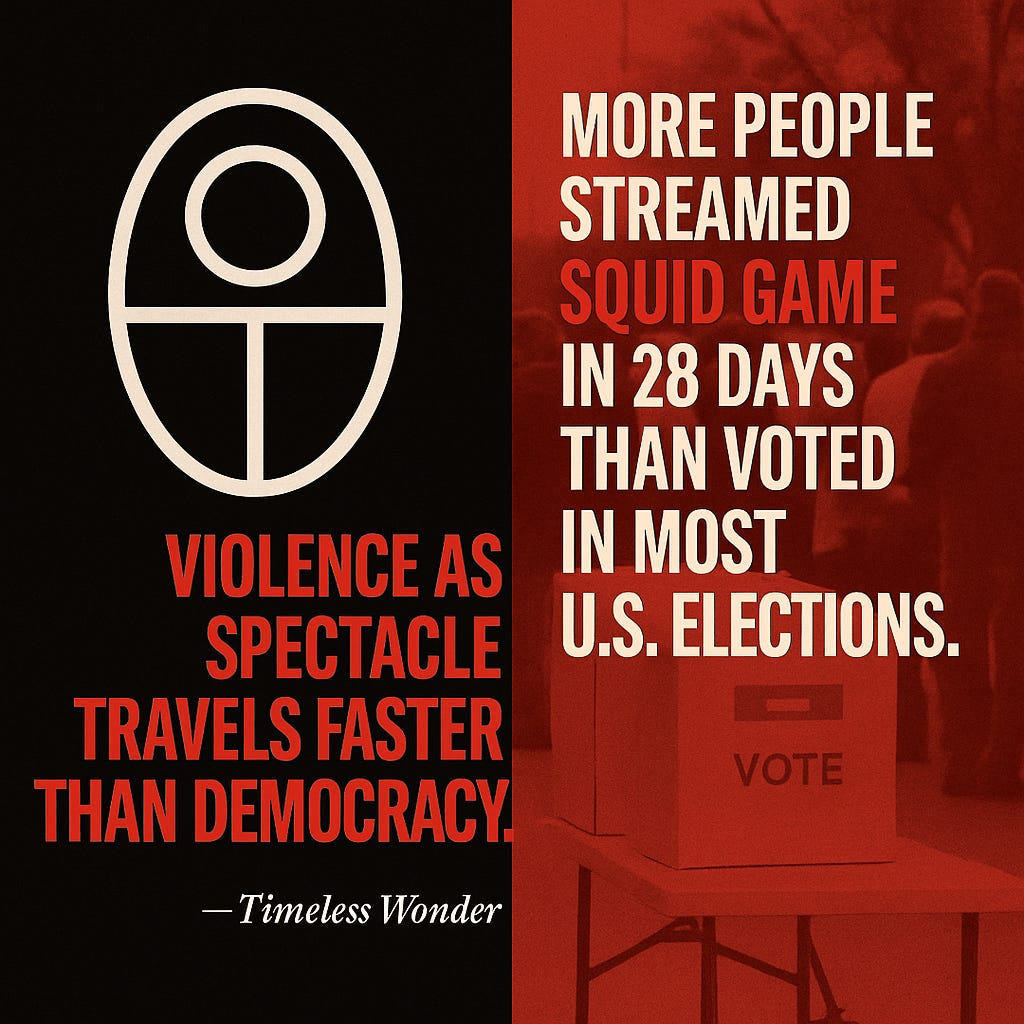When Squid Game aired on Netflix, the world could not stop watching poor people die in candy-colored rooms. This wasn’t just another dystopian Netflix series. It was a global Rorschach test. In South Korea, it mirrored suffocating debt and social despair. In the U.S., it became the most-streamed series ever—proof that capitalism’s marketing becomes binge-worthy. Even little kids were playing Red Light, Green Light in schoolyards. But Squid Game wasn’t just about Korea. It was about us. Because whether you are in Seoul, New York, or Gaza, the rules feel similar.
Compete. Obey. Betray. Survive. And above all, don’t question the game.
“Entertainment is never just play. War is never just strategy. Both are reflections—of who we are and what we value.”
I remember watching Squid Game on a muted screen while a livestream from Gaza played on my phone. One world was entertainment, dressed in neon horror. The other was real—frantic, grainy, full of dust, dust,debris and screams.We binge-watched Squid Game and called it "brilliant social commentary." We scroll past pleading children. We call it "complicated." "Collateral damage." "Too political."
What does this say about our humanity?
The same primal story repeats itself in our cultural products and global conflicts, whether it is the bloody arenas in fictional South Korea or arenas of geopolitical unrest. Squid Game, a cultural phenomenon, dares to expose what sanitized Western media often buries: the desperation, greed, and inequality hardwired into our systems. Entertainment becomes the staging grounds for ancestral instincts in a modern world.
In Squid Game, you die if you lose. In U.S. reality TV, you’re humiliated if you don’t win.
Both reward the same primal drives: manipulation, endurance, betrayal. But they differ in honesty. Squid Game dares to show the violence of the system. American shows celebrate it as empowerment.
In Squid Game, death is literal. In our shows, it is social acceptance—compete or disappear.
These productions aren’t just entertainment. They are cultural diagnostics—revealing how deeply evolutionary instincts like greed and fear still govern us.
The cultural differences lie in how we tell the story. Western media reframes systemic inequality as personal failure. Eastern media, like Squid Game, confronts the system head-on laying bare the human condition.
But, warfare is not a game. It has very real casualties and very little accountability.
In Gaza, children don’t wear uniforms. They carry water. They sleep in tents.
They die anyway.
The Game Is Real
Today, in the geopolitical theater, Israel and Iran, with the U.S. looming in the background, are playing out a very real, high-stakes version of the same game: driven by ideology, legacy, dominance, and retaliation.
As Iran bombards Israel—regardless of its own cost—crowds cheer. It seems surreal. The Iron Dome, once thought invincible, flinches. And people—on the streets, in living rooms, across exiled networks—rejoice. For once, bombing and destruction are no longer a Western monopoly.
For a brief moment, the asymmetry cracks. The sky that brought only surveillance and death now echoes with retaliation. It feels like justice, even if it isn’t.
People gather like it’s a football final. They shout. They dance. This isn’t joy in suffering—it’s a release from years of it. The desensitization was born of watching their pain be ignored, dismissed, justified. Now, for once, the powerful taste fear.
They know it won’t last. The powers are still too strong. But for a single breath, they are not invisible.
This is the paradox of war: when pain is all you have known, revenge feels like hope.
Israel and Iran are locked in a different arena, with the U.S. as referee, sponsor, and silent player. The rules are ancient: defend your tribe, erase your enemy, claim moral ground no matter the cost.
This is not just geopolitics. It’s ancestral logic in real time.
While Israel operates through Westernized logic—tech dominance, preemptive strikes, territorial securitization—Iran counters with ideological projection, religious resistance, and proxy warfare.
Both reveal how dangerously close we remain to our primal programming. Each nation is locked in an existential narrative, fueled by evolutionary survival drives:
Us vs. Them | Sacred vs. Secular | Martyrdom vs. Modernization.
Iran actively works to destabilize Israel via non-state actors, while Israel responds with overwhelming force, legitimized through Western alliances. The result is a never-ending loop of retaliation and radicalization. This is the circle of life in the modern world.
The perpetrator’s justification fuel age old narrative. Iran fuels proxies. Israel drops bombs. Each claims existential threat.And in between, civilians pay. It’s a pattern older than scripture. Ancient tribal logic dressed up in digital surveillance and drone strikes. None of this is surprising. Only now our advanced technologies are deadlier and the human cost is higher.
No ideology—East or West—can justify the butchering of innocents.
Whether it’s Korean fiction, American entertainment, or human conflicts, the undercurrent is the same: we’re all stuck in systems that reward dominance, not dignity. The real test isn’t who wins. It is how we change the game.
Evolution explains how we got here: tribalism, scarcity, fear.
But it can’t excuse what we’re doing now—especially not when we know better.
Empires fall when they confuse technological progress for moral growth. Institutions collapse when they deny the suffering they cause. And people break—when they realize they were never meant to win the game, just play until they disappear.
Instinct vs. Intelligence
We have globalized ancient instincts—turned them into streaming wars, drone strikes, and ideological rivalries. But we also have the tools—empathy, ethics, evolutionary intelligence—to rewrite the rules.
Instinct is the software we came preloaded with. Intelligence is the upgrade we write ourselves.
Evolutionary Instinct is our inherited wiring—automatic, reactive, survival-based. Evolutionary Intelligence is our learned capacity—reflective, ethical, future-oriented.
This is the fundamental human tension. We are built to survive ancient environments, yet we’re living in modern systems that demand more than instinct.
Instincts got us here.
React fast | Protect your group | Take what you can | Defend at all costs
These patterns served us well when life was short, violent, and uncertain. But now they’re being weaponized—through political tribalism, consumer greed, algorithmic manipulation, and war.
Intelligence is how we stay here—together.
Delay gratification | Cooperate beyond tribe | Share power | Expand empathy
This is evolutionary intelligence: the uniquely human ability to outgrow our own defaults. It’s not about ignoring instinct—it’s about integrating it wisely.
Instincts helped us survive in small groups. But evolutionary intelligence helps us survive together at scale—across borders, cultures, and belief systems. The central ethical challenge of our time is to know when to honor our instincts—and when to transcend them.
The most dangerous stories are the ones we don’t know we are telling. That competition is natural. That empathy is weakness. That survival justifies anything.
But that’s not the only script.
From abolition to anti-colonial movements, from ceasefires to civil disobedience, humans have also evolved something else: the ability to interrupt the circle.
So what happens next? We rewrite the script. Or we become it.
And that is where you come in. If evolution gave us the capacity to fear, it also gave us the potential to transcend.
Where in your life are you still playing the game—out of fear, pride, or habit?
What would it look like to stop?




